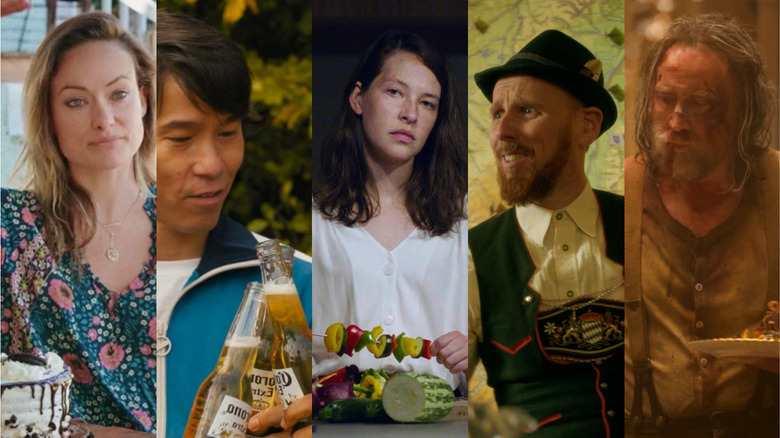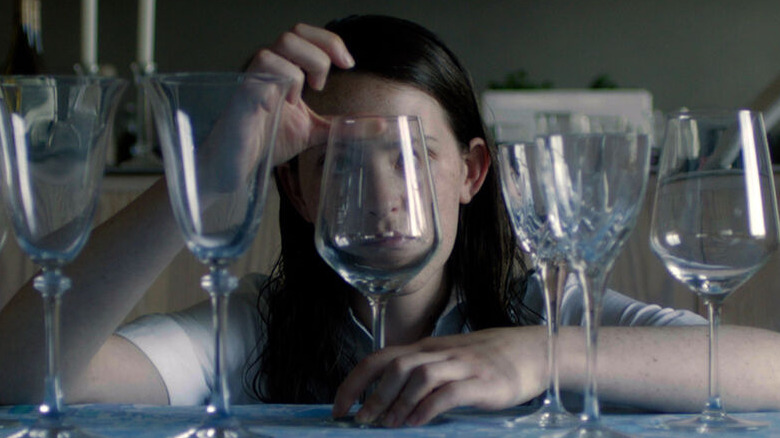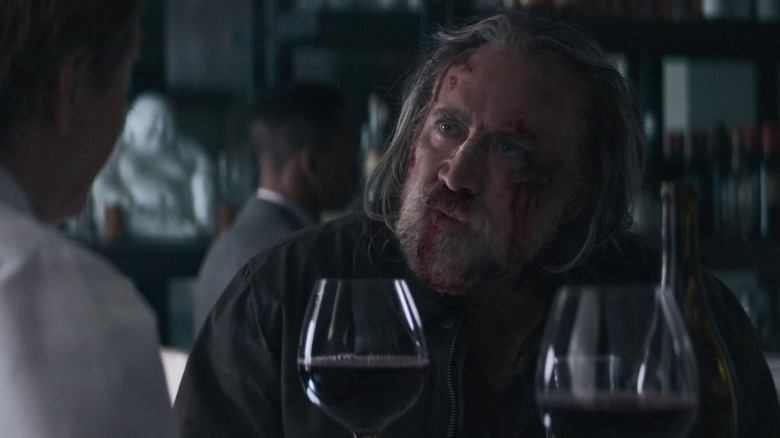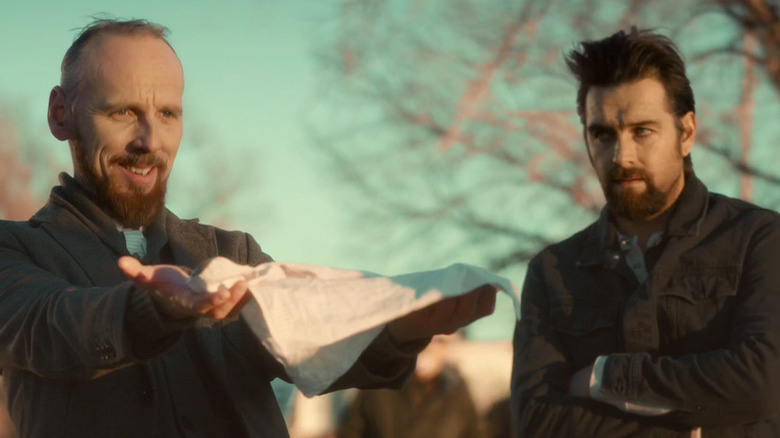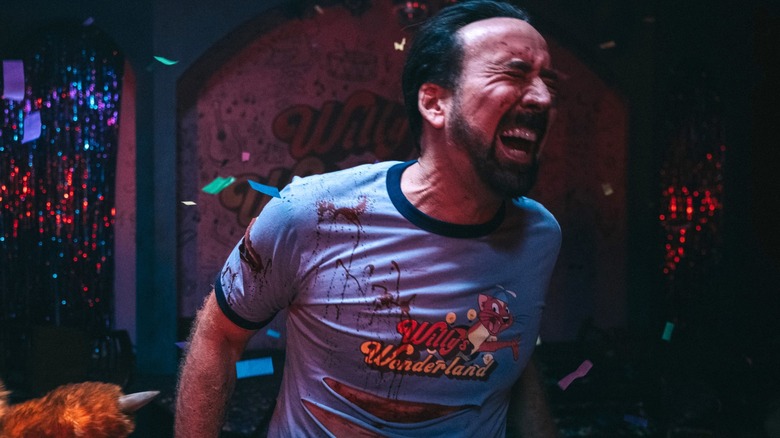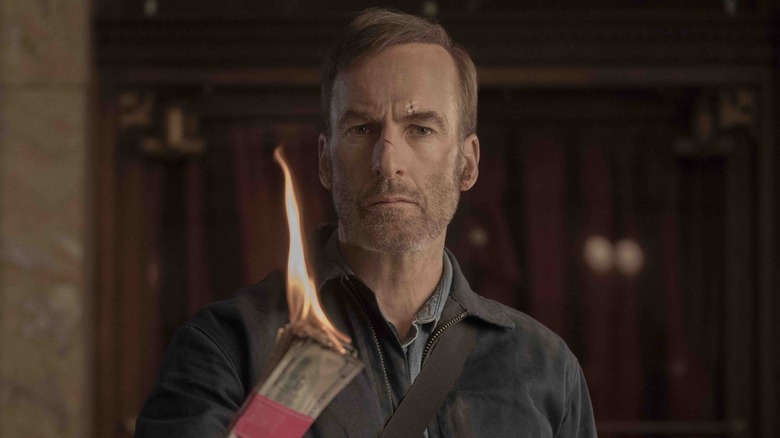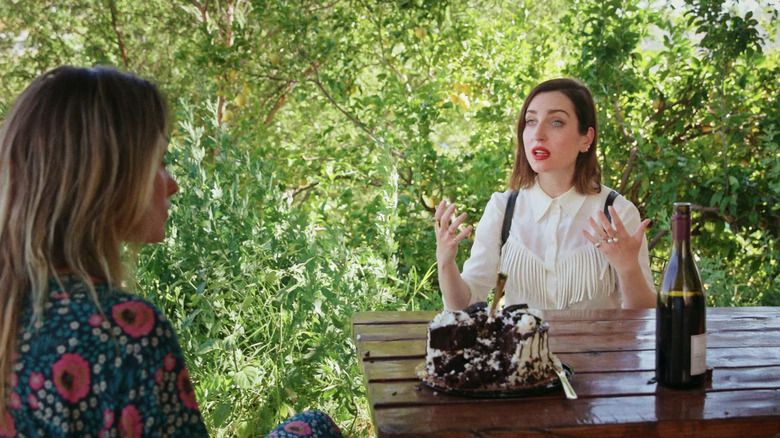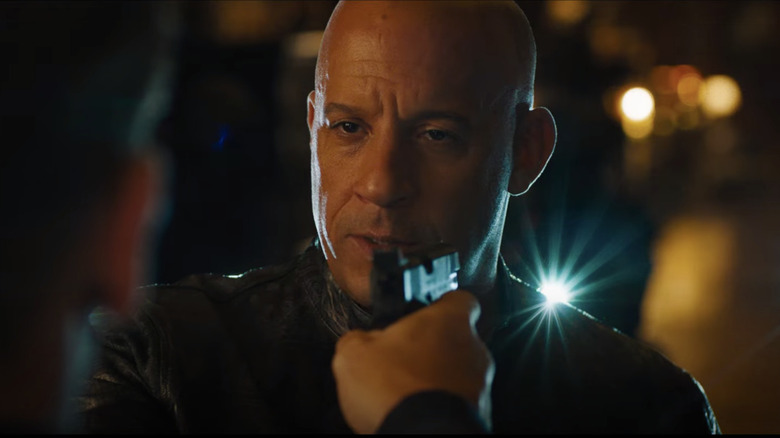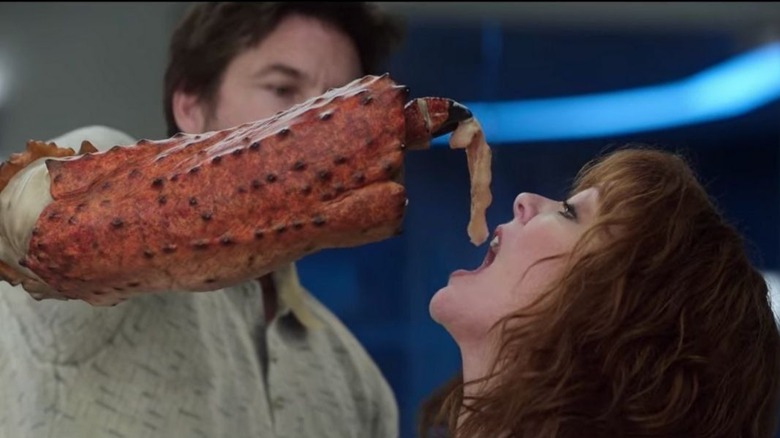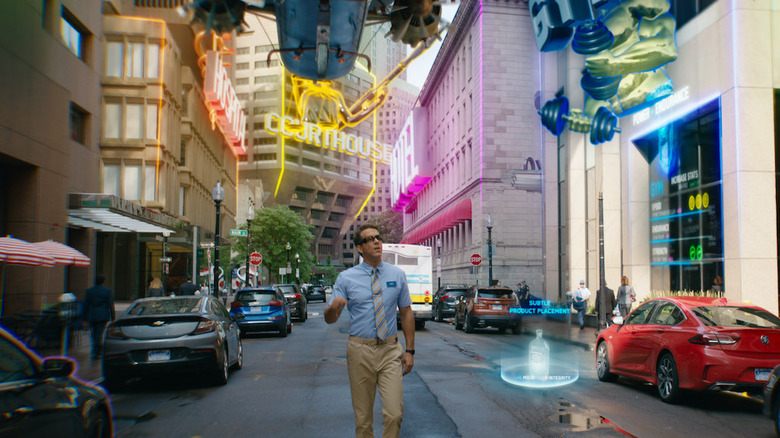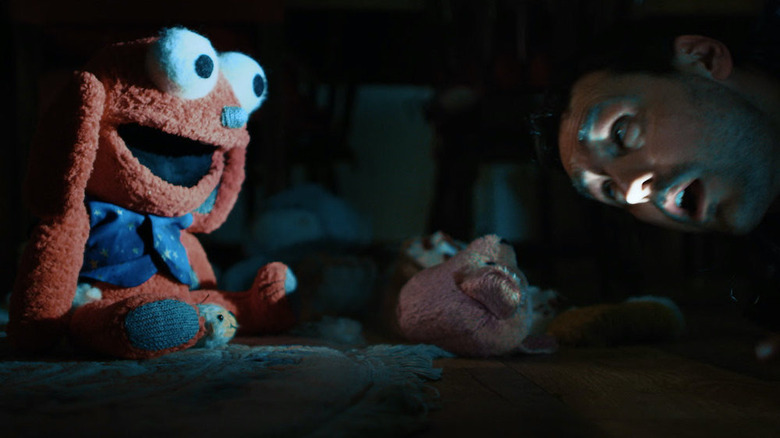The Food That Defined Film In 2021
Another year, another banquet of edible screen arrangements that tell stories through taste, textures, temperature, and anything else a Michelin rated chef examines. I return as your always-hungry film critic with an eye for all the delectable ways writers and directors implement food into their productions. Last year I spoiled myself on Gotham breakfast sandwiches and fried Oily Cakes. Betty Gilpin ate an exquisite grilled cheese. There was a lot to digest.
This year, we run the gamut of gastro-storytelling from serious representations of racial abuse to the jokiest usage of pasta as guts. We support and respect filmmakers who aren't afraid to let their actors speak with their mouths full. Allow ice cream preferences to color a character's personality or beer selection to define a franchise. I hope you've got enough room for a ten-course meal of the year's best cinematic treats!
A Cannibalized Corpse (The Feast)
Why not start with the most disturbing culinary embrace in Lee Haven Jones' Welsh fable, "The Feast?" My briefest explanation: after much psychotropic environmental horror, Mother Nature gets the best of an affluent family who sold their sacred land to a scummy property buyer for destructive mining purposes. All parties gather for a fancy dinner meetup which a Gaia-like entity infiltrates, who then punishes without remorse. Jones focuses on the immaculate food presentation throughout earlier courses in preparation for the businessman's main course — a cannibalistic carvery sequence that ain't pretty.
As chaos ensues around the premises, Rhodri Meilir's shameless terrain-polluter returns to eating the night's "delicious" food. Nia Roberts' housewife walks into the kitchen and starts slicing thin mouthfuls of meat off her son's severed leg like she's running a buffet station. As Meilir's glutton keeps stuffing his cheeks full — now with his head in his plate like a pig at a trough — Roberts heaps what's left of her family onto the careless stooge's plate. Meilir never looks upward, remaining intent on scarfing down every morsel until nothing else remains. He won't stop; he'll never stop — a representation of his bottomless greed that will destroy more than one family once he's poisoned all the soil he'll purchase years, decades later.
"After you've taken everything, what will be left?" The question Roberts' matriarch utters before pulling the trigger of a loaded shotgun pointed to kill, Meilir's fresh corpse full from its fiendish feast.
The Dinner (Pig)
A bird, a bottle, and a salted baguette are all Michael Sarnoski requires for the climax of "Pig." A movie about passion, affection, and connection that culminates over steamy portions. There's plenty to dissect in a single scene where Nicolas Cage's truffle-pig-hunting chef Robin Feld uses the emotion of his craft to show a foe the sorrow in his heart, unlocked through tastes that forever inspire joy. It's genius, as Sarnoski tethers flavors to memories that elevate eating as communal bliss because Cage cares so deeply about every plate from his kitchen. That compassionate obsession, that layering of char and soul, is a powerful kind of exploitation.
Every bite Darius (Adam Arkin) takes weakens the scowl on his face. Wine from Rob's prized mausoleum collection floods Darius' mind with an alcohol and food pairing Rob curated for Darius' most joyous memory alongside his thought-to-be-dead wife. At that moment, Darius realizes what he's stolen from Rob — the death of a piggy is met with many tears — because the immaculate replication of one last cherished memory is the grandest gesture Rob can provide. A morsel in the grand scheme of life, but the most delectable kind. Darius breaks into sobs knowing Rob's pig is deceased, and Rob — in turn — brims with sadness and heartbreak. Food becomes a universal language, understood on a level that speaks to culinary importance beyond a quick nutritional refuel.
Unwanted Meats (American Sausage Standoff)
Welcome to the rural-as-heck pitstop of Gutterbee! Think Nowheresville, USA, where outsiders who dare establish Chinese or German restaurants face the wrath of xenophobic townsfolk. Creator Ulrich Thomsen encases racism, homophobia, and hatred within intestinal pig wrappings for a message that travels as a culinary metaphor. America is supposed to be a melting pot, but how will your stew taste without herbs, spices, and exotic flavors? "American Sausage Standoff" is about just that, since Ewen Bremner and Antony Starr dare tantalize taste buds with forbidden Bavarian links.
Bremner's character cherishes traditional overseas recipes in a town where its mascot is a racist rooster. The messages aren't minced like proteins, nor are metaphors subtle — Bremner's restaurant teaches about sausage history and plants foreign flags in seared meat tubes. The best part, though? Gutterbee's patriotic "defenders" lower their pistols once Bremner starts selling "American Whites" that townsfolk gobble in the most phallic manner because that's the stupidity of their argument. "Keep America for Americans" is negated by trick marketing. "American Sausage Standoff" sizzles in its satire and offers some tasty smoked commentary as one more immigrant defies adversity with the savory tastes of their former homeland.
A Packaged Punch (Willy's Wonderland)
In "Willy's Wonderland," Nicolas Cage's mute janitor guzzles a fizzy energy concoction called Punch. "A fistful of caffeine to your kisser," reads the label. As Cage cleans the abandoned restaurant filled with mercenary animatronic mascots, he takes breaks for pinball and another Punch — almost like they're sustenance. Now, explanations can be written off as a severely exhausted rambler just trying to stay awake, but "Willy's Wonderland" isn't the best with conveying intentions. There's mysteriousness around Cage's robot-buster and the liquid formula surging through his system.
Enter the Reddit theorists who took Punch's nondescript can and went wild.
To illustrate how much detail can be interpreted from a solitary drink, check out the internet sleuths who suggest everything from "Punch is a supersoldier serum" to "Cage is a Lycan, and he times each slurp to fend off transformations." Theorizers connect Punch to Bang — an actual energy drink with 300 milligrams of caffeine — and claim with the number of cans Cage drinks in such a short timeframe, he simply cannot be human. Military dog tags denote service, which establishes his tactical wits when battling Willy's bandmates, but Cage's ease of strength is inexplicable. There are countless questions, all swirling around a beverage that may or may not be a synthetic superhero potion. Who knew "Willy's Wonderland" would be responsible for the single greatest food-and-drink forum debate about cinema this year?
Lasagna Night (Nobody)
In the movie "Nobody," Bob Odenkirk plays an ex-government assassin trying to live a life of domestication. The suburban castle, the early morning jogs, all the staples of residential mundanity without gunshots whizzing past heads. Does all that go sideways? Absolutely. Is there a moment where Odenkirk's Hutch Mansell dreams of all-American serenity get bashed to hell? Indeed. Over lasagna.
How do we paint the ex-mercenary as a family man with a new lease on life? Have him prepare dinner for his family, complete with a "special" recipe — that saucy, starchy, pull-apart-cheesy Italian dish meant to be enjoyed with loved ones. Should criminals invade Odenkirk's household while inhabitants slumber or during a different activity, there's still table-setting for an eventual action outburst — but interrupting an intimate dinner makes for a crystal-clear contrast. It's precisely the swing Odenkirk needs when thugs crash his baked-with-love meal and awaken a bone-crushing beast (also a fair reaction to interrupting anyone's lasagna time).
Going Out In Style (How It Ends)
It's the end of the world. You've spent your entire life abiding by LA's diet culture fads. What's your final order? For me, it's fried pickles, homemade eggplant parm, a side of pillowy steakhouse garlic mashed potatoes, and OddFellows cornbread ice cream. Something about that menu's randomness and sinful indulgence just screams last call, right? Zoe Lister-Jones follows the same principles to represent Olivia Wilde's character in "How It Ends," as she welcomes the apocalypse by gorging on cookies n' cream indulgence and red wine.
Again, as I'll keep repeating, we learn so much about a character by their meal choice. Wilde sits in front of a most decadent multilayered tier cake topped with thick frosting peaks and Oreo cookies, plus a corked bottle of vino, no glass anywhere. A fork and knife rest wedged into the moist structure; tools used to devour almost an entire half. Her energy is "IDGAF," which doubles as Lister-Jones approaches Wilde for a conversation between ex-friends. The exchange's energy matches someone riding out doomsday on a sugar high and comments on the happiness we cut from our lives since Wilde's psychic reaches for rich desserts the moment nothing else matters.
A Corona Toast (F9)
A film franchise's association with brand loyalty is a mutual business decision. Every time Vin Diesel or Michelle Rodriguez slugs another bottle of sweaty, ice-cold Corona, it's meant to sell a product. Intentions are overt. Corona earns a few extra bucks from "Fast & Furious" fans, while producers benefit from financial compensation that guarantees primo product placement. You all know how this works, so why call it out?
Because no one does it better these days than "Fast & Furious."
Dom's backyard barbecues and his crew's obsession with label-forward buckets of Coronas have become synonymous with "Fast & Furious." You know it's family time when everyone toasts with their refreshing Mexican lagers — better yet, we crave the alcohol's appearance. It wouldn't be "F9" without more Corona. Then it's just another overcomplicated heist flick with drift racers, nitrous injections, and so many busted walls because everyone is so goshdarn strong. Corona represents their elixir of freedom; we know the day is saved because golden bubbles float to the surface. It's no longer a drink — it's an in-joke, an identity, and what we fans demand from Universal's billion-dollar baby (driver).
Kingpin Crab (Thunder Force)
Long durations of "Thunder Force" were decidedly not my brand of comedy. But everything involving Jason Bateman as "The Crab," a gangster with kingly crab claws? I'm a sucker for succulent food-based comedy, which Ben Falcone serves in a restaurant scene between Bateman's criminal crustacean and Melissa McCarthy's bumbling superhero. Things get heated, the restaurant offends Batemen, and it's a humorous accentuation of slapstick culinary chuckles.
Bateman's snappy customer is first recommended a seafood tower, which is met with frustrated sarcasm as the waiter backpedals. Then McCarthy flips on the seduction tactics. She starts stroking Bateman's prodigious claw at the joint as they lock eyes. The camera pans up to their reactions, then back down to McCarthy as she uses table butter like massage oil. "Uh oh," Bateman acknowledges. "I'm just butterin' your knuckle," McCarthy entices in a sensual hush.
I don't care who you are; that's funny. A toast to a duo of comedians making the most out of greasy tabletop flirting, mealtime immaturity, and from-the-kitchen lubrication.
I Guess One Person Likes Bubblegum Ice Cream (Free Guy)
Defining a character through taste preferences generally requires extremes. If Ryan Reynolds' non-playable character in "Free Guy" likes vanilla or chocolate ice cream, he's just another generic bank teller with a sweet tooth. If he likes Rocky Road or Butter Pecan, there's a little more definition of adventurousness yet still nothing outstandingly abnormal. But radioactive-pink bubblegum flavored ice cream? A tub of unicorn vomit that tastes so sugary you can feel the dentist's piercing drill when the frigid mixture hits your teeth? It's so soft the "Letterkenny" crew would add it to their super-soft birthday supplies.
"Free Guy" isn't the most complex character study, but that's why Guy's creamy bubblegum infatuation is memorable. It's a standout way to sell Guy's innocence, his wholesomeness, using a treat that's so childlike. In contrast to the players of Free City who'd trash the ice cream vendor's cart for extra experience, Guy's the one who seeks comfort in each vibrant, icy delight. That speaks volumes about Guy and requires nothing more than a snack break.
Spaghetti Slayer (Benny Loves You)
Mother always said don't play with your food — but mother hasn't seen "Benny Loves You." In it, a plush plaything springs to life when his owner is down in the dumps. Benny serves as best friend and guardian, which leads to dead bodies when Benny's methods turn out to be murderous. Benny even targets Jack's other stuffed animals (Jack is played by writer, director, and star Karl Holt), who meet the end of Benny's blade just as gruesomely as the film's human victims: with their "intestines" spilled, as represented by sauced spaghetti.
It's a detail that adds so much humor to Benny's anthropomorphic chopping spree because — at base value — it's comical to understand Benny's jealousy as he beheads and unstuffs Jack's other huggables. That's where the joke could have stopped, but Holt goes a step farther. It's a horror flick anyway; why not slather the gore? Benny has the inspiration to cook spaghetti, take tomatoey marinara, and recreate a crime scene with explicit noodle placement. It works to sell how unhinged Benny can become when seeing red, and the unexpected gag slays. Holt goes that one extra mile to amplify both the horror and comedy of a scenario, just like grandma might.
